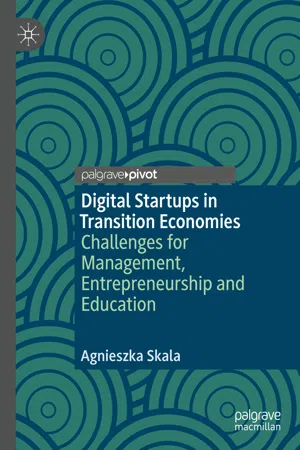The purpose of this chapter is to carry out a critical review of different definitions of a startup found in the literature, and then to propose my own definition, taking into account a theoretical model of a startup development process considered as a manifestation of innovative entrepreneurship. This task also requires organising the most important concepts related to startups in the context of theories of management and entrepreneurship .
Although a growing number of scholars have been trying to capture and describe the unique specific characteristics of the startup phenomenon in recent years, there is still no general agreement as to what a startup is—both among scientists and business support institutions and among entrepreneurs themselves (Breschi et al. 2018). Originally, this concept referred to all new economic entities entering the market. Such a definition did not raise any controversy until the term began to be strongly associated with a specific category of enterprises connected to the dynamically developing information and communication technologies (ICT) sector, in particular the Internet, as a medium of universal, immediate, and virtually unlimited communication. These developments raised hopes in the context of increasing innovation and accelerating economic growth, especially in developed countries. A lack of precision in formulating the criteria for distinguishing these types of projects from other micro- and small enterprises may, for example, negatively affect the effectiveness of measures supporting the development of such projects implemented by various institutions (including public bodies) in many countries.
Regardless of the results of a detailed analysis, the concept of a startup is undoubtedly associated with running a business in its initial phases and with implementing innovations. Three groups of enterprises that can be initially classified as startups are of note. The first one includes projects from the so-called creative industries, that is, associated with creative design, crafts, and fine art. The second is entrepreneurship in science, that is, technology transfer and the commercialisation of inventions. Finally, the third group includes projects belonging to the so-called digital industry, where information processing technologies are one of the key elements in the business model . On the basis of these categories, this work will focus on the examination of the last of these three groups, because each operates according to different principles and they should not be considered together. The mechanisms of their functioning significantly differ for each of the startup categories and considering them together is not likely to result in a clear research process or a good analysis of the research results (Skala 2016).
Discussions and disagreements about innovative entrepreneurs and their role in economic development have been ongoing for nearly a century, inspired by the father of modern entrepreneurship—Joseph Schumpeter. On the other hand, startups are associated with a fundamental breakthrough in the economic, social, and even civilisational dimension, related to the spread of ICT (especially the Internet). The so-called new digital economy creates qualitatively new conditions for the functioning of startups. These issues will be presented and discussed first.
1.1 Entrepreneurship and Innovation
Joseph Schumpeter (1942) introduced the concept linking entrepreneurship with innovation to economic sciences. He defined “creative destruction” as a simultaneous combination of “creativity”, “novelty”, “innovation”, and “development”, and he defined entrepreneurs as—above all—innovators. Entrepreneurs, according to Schumpeter, are the agents of creative destruction, allowing the economy to experience changes that make progress possible and lead to the development of civilisation. He pointed out the power of innovation, which can destroy even the most durable corporations, and argued that the threat from radical (breakthrough) better solutions and new market entrants keeps the main players (currently the term “incumbents” is used) disciplined and willing to incur the costs of research and development investments, whose implementation leads to economic and civilisational progress, ultimately raising the standard of living of the lowest social classes (in the long run). According to Schumpeter, openness to innovation constitutes and distinguishes an “entrepreneur” from an “employee”, while creative destruction consists in the emergence of new generations of innovators appearing as successive “waves” of innovation, which, although commercially obliterating the previous “generations”, also generate added value in the form of an increasing (in absolute terms) quality of goods and services. It can therefore be said that the context of innovation is critically important for further consideration of startups as a new form of entrepreneurship.
Innovators and Imitators
Since Schumpeter , innovative entrepreneurial initiatives have been researched in conjunction with the entrepreneur as an individual, considered to be the catalyst and in possession of traits and skills that enabled innovation to be transformed into market value by creating new products and services (Shane 2003; Ács et al. 2009). Innovative entrepreneurs can be recognised by their unique ability and willingness to find and exploit new market opportunities (Wennekers and Thurik 1999). Certain individual characteristics of the entrepreneurs, their appropriate education, and access to specific resources (e.g. knowledge, tools, interpersonal networks) increase the likelihood of success (Shane 2000; Koellinger 2008). This direction of thinking was shared by Peter Drucker, recognised as a major authority in the field of management. He believed (1992) that only entrepreneurs who created new markets or implemented new solutions represented “real” entrepreneurship, regardless of the level of risk, the amount of money invested, or the number of jobs created. In contrast to this view, William Baumol (2010) valued the successes of imitators, that is, those who did not implement original solutions, but, thanks to minor improvements, often achieved better business outcomes than pioneers and innovators in the long run. This dispute remains one of the fundamental and unresolved questions in the area of entrepreneurship research and is related to the difference...
